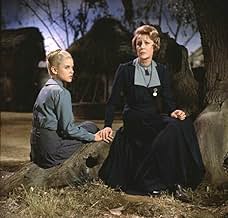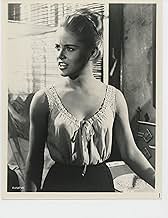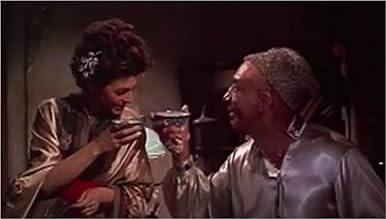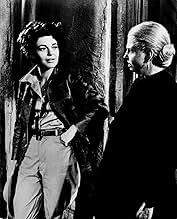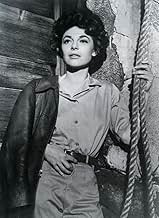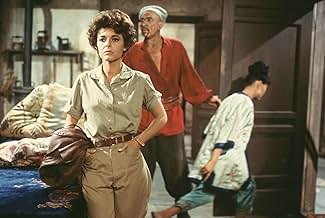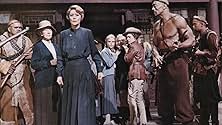IMDb RATING
6.7/10
2.9K
YOUR RATING
In 1935 China, seven dedicated missionary women try to protect themselves from the advances of a barbaric Mongolian warlord and his cut-throat gang of warriors.In 1935 China, seven dedicated missionary women try to protect themselves from the advances of a barbaric Mongolian warlord and his cut-throat gang of warriors.In 1935 China, seven dedicated missionary women try to protect themselves from the advances of a barbaric Mongolian warlord and his cut-throat gang of warriors.
- Director
- Writers
- Stars
- Awards
- 1 nomination total
Lee Kolima
- Warrior
- (uncredited)
- Director
- Writers
- All cast & crew
- Production, box office & more at IMDbPro
Featured reviews
For a film nut like me. 7 Women offers a plethora of pleasures. Patricia Neal was suppose to star but ill health made her unavailable. Anne Bancroft took over as the drinking, smoking, swearing saint. and all the aspects of this complex character are totally real in Anne Bancroft's face. She arrives to the Mission in China like a benevolent tornado. The spectacular Margaret Leighton is the head of the Mission and she plays it like a raw nerve, Among the other women, Flora Robson, Queen Elizabeth to Laurence Olivier's Michael Ingolby in Fire Over England, brings a voice of reason that reassure us, Betty Field , Kim Novak's mother in Picnic, among a gallery of memorable characters, plays the pregnant middle age woman who offends the Christian mission for having had sex with her husband under their roof. Mildred Dunnock, Anna Lee and even Stanley Kubrick's Lolita, Sue Lyon is part of the Mission. On the other side, the villains, that offended so many people, John Ford casts his longtime companion Woody Strode. I understand and even accept all the criticisms listed in the reviews of this pages but, somehow, I can put all that aside and enjoy the plethora of pleasures that it offers.
I wonder what feminists feel about this film. I found this work to be a fascinating look at women by a male director that can compare with two other cinematic works: Paul Mazursky's "The Unmarried Woman" and Muzaffar Ali's "Umrao Jaan". Strong women, weak women, lesbians, and immature girls, are contrasted with cardboard male characters that are never fully developed and are obviously no match to the array of women portrayed in the film. The men are painted so negatively that one begins to wonder if Ford thought Asian men had more brawn than brain--a strange view that has gained currency in Hollywood cinema.
I applaud Ford's decision to cast Anne Bancroft in this role. This is one of her strong performances. She makes even the most vapid films look elegant with her roles ("Lipstick", "Little Nikita", to name just two). Ford develops her role "7 women" on the lines of a Western gunslinger--only there are no gunfights. The woman has a weapon: sex. That weapon can down all the bad guys faster than it takes to down Mexicans, Red Indians, rustlers, bank-robbers. In this film these bad men are Chinese/Mongolian thugs. Established thespians Dame Flora Robson and Margaret Leighton are totally eclipsed by Bancroft's riveting performance.
What Ford wanted I guess was to stun the viewer with the ending--the twist preceded by the gradual softening of the Bancroft in men's clothes to the Bancroft in women's clothes and the acceptance of male superiority. Most critics have found the end facile but I found the end was powerful as it makes you review and reconsider the strength of the lead character.
The film questions established views on religion; evidently Ford was old enough to have seen enough to choose to make this film in the evening of his life. In his films, Ford's women are as interesting as any other aspect of his cinema and this film provides ample fodder for those interested in studying this element of Ford's work.
However, for a 1966 film, the studio sets for the film look too artificial for the serious cinema the film offers. If anything, the film makes the viewer think!
I applaud Ford's decision to cast Anne Bancroft in this role. This is one of her strong performances. She makes even the most vapid films look elegant with her roles ("Lipstick", "Little Nikita", to name just two). Ford develops her role "7 women" on the lines of a Western gunslinger--only there are no gunfights. The woman has a weapon: sex. That weapon can down all the bad guys faster than it takes to down Mexicans, Red Indians, rustlers, bank-robbers. In this film these bad men are Chinese/Mongolian thugs. Established thespians Dame Flora Robson and Margaret Leighton are totally eclipsed by Bancroft's riveting performance.
What Ford wanted I guess was to stun the viewer with the ending--the twist preceded by the gradual softening of the Bancroft in men's clothes to the Bancroft in women's clothes and the acceptance of male superiority. Most critics have found the end facile but I found the end was powerful as it makes you review and reconsider the strength of the lead character.
The film questions established views on religion; evidently Ford was old enough to have seen enough to choose to make this film in the evening of his life. In his films, Ford's women are as interesting as any other aspect of his cinema and this film provides ample fodder for those interested in studying this element of Ford's work.
However, for a 1966 film, the studio sets for the film look too artificial for the serious cinema the film offers. If anything, the film makes the viewer think!
John Ford, usually with the reputation of misogynist, directed his last film surrounded by strong female characters and where the male characters are not particularly relevant. The movie is set in China, 1935, where a Civil War is taking place. Anne Bancroft, a female doctor who is also an atheist, says: "I spent years in slum hospitals. I never saw God come down and take care of anyone". Ford, with his catholic roots, allows himself to be pessimistic. Even when Margaret Leighton, a supposed strong believer is confronted by the female doctor, she says: "I've always searched for something that... isn't there. And God is not enough. God help me - He isn't enough".
The title refers to seven women, but the fact is that there are eight: What led us to believe that Anne Bancroft is excluded from the beginning? She wears man's clothes, she smokes and drinks. The loner Bancroft, condemned to always walk alone, like Ethan Edwards in "The Searchers". And what about the final scene, with a rare beauty, where the viewer isn't allowed to watch her fall? She is dressed in woman's clothes for the first time and is prepared to a truly catholic gesture, the sacrifice. "Seven Women" is a beautiful film, almost perfect. Towards the end, we become aware that Mr. Ford will live eternally.
The title refers to seven women, but the fact is that there are eight: What led us to believe that Anne Bancroft is excluded from the beginning? She wears man's clothes, she smokes and drinks. The loner Bancroft, condemned to always walk alone, like Ethan Edwards in "The Searchers". And what about the final scene, with a rare beauty, where the viewer isn't allowed to watch her fall? She is dressed in woman's clothes for the first time and is prepared to a truly catholic gesture, the sacrifice. "Seven Women" is a beautiful film, almost perfect. Towards the end, we become aware that Mr. Ford will live eternally.
It's 1935 in northern China near the Mongolian border. Agatha Andrews leads a mission where Dr. D.R. Cartwright (Anne Bancroft) arrives. Charles Pether (Eddie Albert) and Emma Clark (Sue Lyon) are two of the teachers. Refugees arrive from another mission after an attack by ruthless Mongolian warlord Tunga Khan.
It's legendary western director John Ford's final film. It would be nice to have more exterior shots of the landscape. The religious righteousness of Agatha Andrews could be more prominent earlier in the movie. It's also maybe more interesting to have the movie start with the doctor journey to the mission. I just want more foreshadowing of what happens between them later in the movie. Otherwise, this is an intriguing eastern. Tunga's brutality is believable. Sure it would be nice if a non-white guy could play the role but that's expecting too much for a film of this era.
It's legendary western director John Ford's final film. It would be nice to have more exterior shots of the landscape. The religious righteousness of Agatha Andrews could be more prominent earlier in the movie. It's also maybe more interesting to have the movie start with the doctor journey to the mission. I just want more foreshadowing of what happens between them later in the movie. Otherwise, this is an intriguing eastern. Tunga's brutality is believable. Sure it would be nice if a non-white guy could play the role but that's expecting too much for a film of this era.
7 Women (1966)
Anne Bancroft fans, check out the forgotten drama 7 Women. She plays a tough, capable woman doctor sent to a missionary in China. This isn't important, but her short, curly hair is just adorable. What is important is the setting: a small village with limited resources and impending doom. Margaret Leighton heads up the missionary, and even though she's received word that a ruthless Mongolian bandit is headed their way, she refuses to flee to a safer location. She believes that the bandits will respect their Christianity and leave them unharmed, but when Anne arrives, she scoffs at the notion that religion will protect them.
Eddie Albert and his pregnant wife, Betty Field, need Anne's services the most. As an older woman, the pregnancy could have complications, but they also refuse to leave. Sue Lyon is an impressionable girl who first looks up to Margaret and then Anne. Flora Robson and Mildred Dunnock are also in the supporting cast. What can seven women and one useless man (sorry, Eddie) do when faced with such terrible danger? This very tense drama has a lot going for it, but strong women beware: it's upsetting. You won't see the twists and turns coming, and when they happen you'll probably be in shock for a while. But you will think Anne Bancroft is the bravest lady ever.
Eddie Albert and his pregnant wife, Betty Field, need Anne's services the most. As an older woman, the pregnancy could have complications, but they also refuse to leave. Sue Lyon is an impressionable girl who first looks up to Margaret and then Anne. Flora Robson and Mildred Dunnock are also in the supporting cast. What can seven women and one useless man (sorry, Eddie) do when faced with such terrible danger? This very tense drama has a lot going for it, but strong women beware: it's upsetting. You won't see the twists and turns coming, and when they happen you'll probably be in shock for a while. But you will think Anne Bancroft is the bravest lady ever.
Did you know
- TriviaAnne Bancroft recalled producer and director John Ford's tearing pages out of the script and described him as "Marvelous but loony."
- GoofsDr. Cartwright's hairstyle is not out of place for 1935. Dr. Cartwright is a strong, independent woman and it is not unusual for her to have this type of hairstyle - see Amelia Earhart. Besides, short hair worn off the shoulder was a very popular style in the 1930s.
- Quotes
Dr. D.R. Cartwright: [to Tunga Khan, Bandit Leader] So long, ya bastard!
- Crazy creditsPROLOGUE: "1935: North China near the border of Mongolia...A land of feudal war lords and marauding bandit armies...A time of lawlessness and violence."
- ConnectionsReferenced in MGM 40th Anniversary (1964)
- SoundtracksJesus Loves Me
(uncredited)
Words by Anna B. Warner and David Rutherford McGuire
Music by William B. Bradbury
Sung by Sue Lyon and the children
- How long is 7 Women?Powered by Alexa
Details
- Release date
- Country of origin
- Languages
- Also known as
- 7 Women
- Filming locations
- Production companies
- See more company credits at IMDbPro
Box office
- Budget
- $2,300,000 (estimated)
- Gross worldwide
- $228
- Runtime1 hour 27 minutes
- Color
- Aspect ratio
- 2.35 : 1
Contribute to this page
Suggest an edit or add missing content



